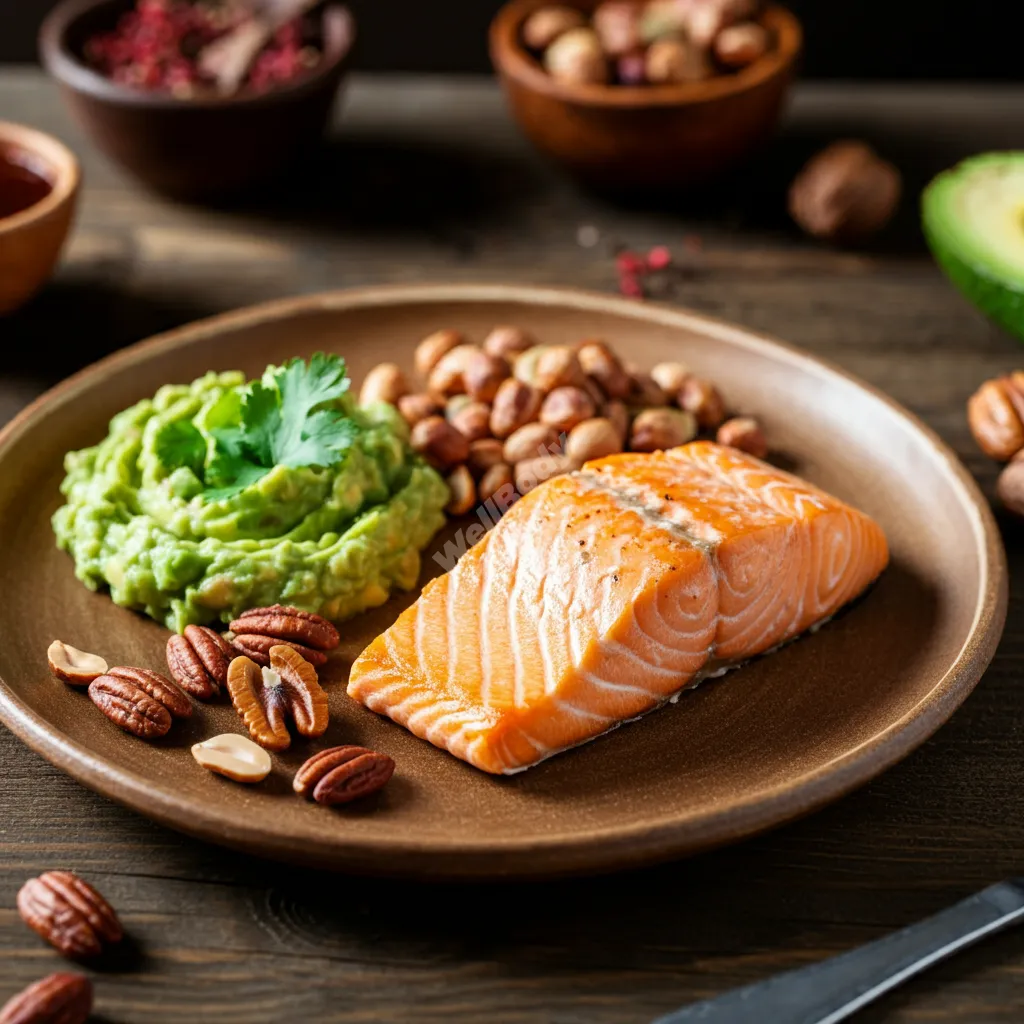4 Revolutionary Diet Plans for Revolutionary Weight Management

Introduction
Imagine stepping on the scale and feeling a sense of accomplishment instead of dread. Sounds revolutionary, doesn’t it? Well, that’s exactly what we’re going to explore today – revolutionary diet plans that are changing the game in weight management.
Did you know that according to a recent study, 95% of diets fail in the long term? That’s right, the vast majority of people who lose weight end up regaining it. But don’t lose hope! We’re about to dive into four innovative approaches that are turning the traditional dieting world upside down. These revolutionary diet plans promise not just weight loss, but sustainable weight management strategies that could transform your relationship with food and your body.
Why Traditional Diets Often Fail

Have you ever wondered why so many people struggle to keep the weight off after dieting? The truth is, traditional diets often set us up for failure. Let’s explore why:
- Unsustainable Restrictions: Many conventional diets impose strict rules and severe calorie restrictions. While these might lead to quick weight loss, they’re often too difficult to maintain long-term.
- Ignoring Individual Needs: One-size-fits-all diets don’t account for personal preferences, lifestyles, or metabolic differences. What works for one person may not work for another.
- Neglecting Psychological Factors: Traditional diets often focus solely on food, ignoring the emotional and psychological aspects of eating.
- Short-Term Mindset: Many people view diets as temporary fixes rather than lifestyle changes, leading to a cycle of losing and regaining weight (often called yo-yo dieting).
- Nutrient Deficiencies: Overly restrictive diets can lead to nutrient deficiencies, which can negatively impact health and make weight management more challenging.
These shortcomings of traditional diets highlight the need for more sustainable and effective approaches to weight management. That’s where our revolutionary diet plans come in, offering fresh perspectives on how we think about food and weight loss.
1. The Intermittent Fasting Revolution

Intermittent fasting has taken the weight management world by storm, offering a fresh perspective on when we eat rather than just what we eat. But what exactly is it?
Intermittent fasting is an eating pattern that cycles between periods of fasting and eating. It’s not about which foods you eat, but rather when you eat them. Here are some popular types:
- 16/8 Method: Fast for 16 hours and eat within an 8-hour window each day.
- 5:2 Diet: Eat normally for 5 days and restrict calories to 500-600 for 2 non-consecutive days.
- Eat-Stop-Eat: Involve a 24-hour fast once or twice a week.
Benefits of intermittent fasting for weight management:
- Improved Insulin Sensitivity: Helps your body use insulin more effectively, potentially aiding in weight loss.
- Increased Fat Burning: Fasting periods may boost your body’s ability to burn fat.
- Reduced Calorie Intake: Often leads to naturally eating fewer calories.
- Simplicity: Can be easier to follow than complex diet plans.
However, intermittent fasting isn’t without its challenges. Some people may experience:
- Hunger and irritability during fasting periods
- Difficulty maintaining social eating schedules
- Potential overeating during eating windows
To overcome these challenges, start slowly, stay hydrated, and listen to your body. Remember, intermittent fasting is a tool for sustainable weight management, not a quick fix.
2. The Plant-Based Diet Revolution

The plant-based diet revolution is changing the way we think about nutrition and weight management. But what exactly does it mean to eat plant-based?
A plant-based diet focuses on foods primarily from plants. This includes not just fruits and vegetables, but also nuts, seeds, oils, whole grains, legumes, and beans. It doesn’t mean that you’re vegetarian or vegan and never eat meat or dairy. Rather, you’re proportionately choosing more of your foods from plant sources.
Here’s how plant-based diets contribute to weight management:
- Lower in Calories: Plant foods are often less calorie-dense than animal products.
- High in Fiber: Helps you feel full and satisfied with fewer calories.
- Nutrient-Dense: Provides essential vitamins and minerals that support overall health.
- Reduces Inflammation: May help reduce inflammation linked to weight gain.
Types of plant-based diets:
| Diet Type | Description |
|---|---|
| Vegan | Excludes all animal products |
| Vegetarian | Excludes meat, may include dairy and eggs |
| Flexitarian | Mostly plant-based with occasional meat |
When adopting a plant-based diet, it’s crucial to focus on these key nutrients:
- Protein: Found in legumes, nuts, seeds, and whole grains
- Vitamin B12: May need supplementation if fully vegan
- Iron: Found in leafy greens, legumes, and fortified foods
- Omega-3 fatty acids: Found in flaxseeds, chia seeds, and walnuts
Remember, the goal of a plant-based diet is not just weight management, but overall health and sustainable lifestyle changes.
3. The Ketogenic Diet Revolution

The ketogenic diet, or “keto” for short, has gained immense popularity in recent years as a revolutionary approach to weight management. But what’s the science behind it?
The keto diet is a high-fat, low-carbohydrate diet that aims to put your body into a metabolic state called ketosis. In this state, your body becomes incredibly efficient at burning fat for energy instead of carbohydrates.
How ketosis aids in weight management:
- Increased Fat Burning: Your body becomes a fat-burning machine.
- Reduced Appetite: High-fat foods can help you feel fuller for longer.
- Improved Insulin Sensitivity: May help regulate blood sugar levels.
- Preserved Muscle Mass: Unlike some diets, keto tends to preserve muscle while burning fat.
Foods to eat on a keto diet:
- Meats and fatty fish
- Eggs
- High-fat dairy (butter, cream, cheese)
- Nuts and seeds
- Healthy oils (olive oil, coconut oil)
- Low-carb vegetables (leafy greens, broccoli, cauliflower)
Foods to avoid:
- Grains and starches
- Sugary foods
- Most fruits
- Legumes and beans
- Root vegetables and tubers
Potential benefits of the ketogenic approach:
- Rapid weight loss
- Improved mental clarity
- Increased energy levels
Potential risks:
- Initial “keto flu” symptoms
- Nutrient deficiencies if not well-planned
- May be challenging to maintain long-term
Remember, while the ketogenic diet can be effective for weight management, it’s important to consult with a healthcare professional before making such a significant dietary change.
4. The Intuitive Eating Revolution

Intuitive eating is perhaps the most revolutionary approach on our list, as it challenges traditional notions of dieting altogether. But what exactly is it?
Intuitive eating is a philosophy of eating that makes you the expert of your body and its hunger signals. It’s not a diet or a weight loss plan. Instead, it’s a mindful approach to eating that encourages a healthy relationship with food and body image.
How intuitive eating can lead to sustainable weight management:
- Eliminates Food Guilt: By removing labels of “good” or “bad” foods, it reduces stress around eating.
- Promotes Body Trust: You learn to trust your body’s natural hunger and fullness cues.
- Encourages Mindfulness: Helps you become more aware of how different foods affect your body.
- Reduces Binge Eating: By allowing all foods, it can decrease the urge to overeat “forbidden” foods.
Steps to start practicing intuitive eating:
- Reject the diet mentality
- Honor your hunger
- Make peace with food
- Challenge the food police
- Discover the satisfaction factor
- Feel your fullness
- Cope with your emotions with kindness
- Respect your body
- Movement – feel the difference
- Honor your health with gentle nutrition
Overcoming challenges in adopting intuitive eating:
- Be patient with yourself – it’s a learning process
- Seek support from a registered dietitian or therapist specializing in intuitive eating
- Practice self-compassion as you unlearn diet culture messages
- Remember that health is about more than just weight
While intuitive eating isn’t focused on weight loss, many find that it leads to a more stable, healthy weight over time. It’s about creating a sustainable, peaceful relationship with food and your body.
Comparing the Revolutionary Diet Plans

Now that we’ve explored these four revolutionary approaches to weight management, let’s compare them side by side to help you understand their key differences and similarities.
| Diet Plan | Main Focus | Pros | Cons |
|---|---|---|---|
| Intermittent Fasting | When you eat | • Flexible • May improve insulin sensitivity • Can be combined with other diets | • Potential hunger during fasting periods • May be challenging for social eaters |
| Plant-Based Diet | What you eat | • Rich in nutrients and fiber • Environmentally friendly • May reduce risk of chronic diseases | • Requires careful planning for balanced nutrition • May be challenging for meat lovers |
| Ketogenic Diet | Macronutrient balance | • Rapid initial weight loss • May improve mental clarity • Can reduce hunger | • Restrictive • Potential “keto flu” symptoms • May be difficult to maintain long-term |
| Intuitive Eating | Relationship with food | • Promotes body trust and acceptance • Reduces food-related stress • Sustainable long-term approach | • Not focused on weight loss • Requires patience and self-reflection • May be challenging for those with a history of dieting |
Factors to consider when choosing a diet plan:
- Your lifestyle: Choose a plan that fits with your daily routine and preferences.
- Health goals: Consider your overall health objectives, not just weight loss.
- Sustainability: Think about whether you can maintain this approach long-term.
- Personal values: Align your choice with your beliefs about food and health.
- Medical considerations: Always consult with a healthcare professional before making significant dietary changes.
Remember, the most effective diet plan is one that you can stick to consistently. It’s not about finding the “perfect” diet, but rather a sustainable approach to nourishing your body and managing your weight.
Tips for Successful Implementation

Adopting a new diet plan can be challenging, but with the right approach, you can set yourself up for success. Here are some general tips to help you implement any of these revolutionary diet plans:
- Start slowly: Gradual changes are often more sustainable than drastic ones.
- Plan ahead: Meal planning and preparation can help you stay on track.
- Stay hydrated: Drinking enough water is crucial for overall health and can support weight management.
- Get enough sleep: Poor sleep can interfere with hunger hormones and metabolism.
- Manage stress: High stress levels can impact eating habits and weight.
- Track your progress: Keep a journal of your food intake, feelings, and any changes you notice.
- Be patient: Sustainable weight management takes time.
Importance of personalization and listening to your body:
Remember, there’s no one-size-fits-all approach to diet and weight management. It’s crucial to:
- Listen to your body’s signals: Pay attention to how different foods make you feel.
- Adjust as needed: Be willing to modify your approach based on your body’s response.
- Focus on overall health: Don’t fixate solely on the number on the scale.
Role of exercise in conjunction with diet for weight management:
While diet plays a crucial role in weight management, physical activity is also important:
- Helps maintain muscle mass during weight loss
- Boosts metabolism
- Improves mood and reduces stress
- Supports overall health and well-being
Remember, the goal is to find a sustainable approach that works for you in the long term. It’s not just about losing weight, but about creating a healthier, happier relationship with food and your body.
Conclusion

As we wrap up our exploration of revolutionary diet plans, let’s recap the four approaches we’ve discussed:
- Intermittent Fasting: Focuses on when you eat, cycling between periods of eating and fasting.
- Plant-Based Diet: Emphasizes foods from plant sources, promoting health and sustainability.
- Ketogenic Diet: A high-fat, low-carb approach that aims to shift your body into fat-burning mode.
- Intuitive Eating: A non-diet approach that teaches you to trust your body’s natural hunger and fullness cues.
Each of these plans offers a unique perspective on weight management, challenging traditional notions of dieting. The key takeaway? There’s no single “perfect” diet that works for everyone. The most effective approach is one that you can maintain consistently over time.
Remember, sustainable weight management is about more than just losing pounds. It’s about nourishing your body, improving your health, and developing a positive relationship with food. As you consider these revolutionary approaches, focus on finding a plan that aligns with your lifestyle, preferences, and long-term health goals.
It’s crucial to emphasize that before embarking on any significant dietary changes, you should consult with healthcare professionals. They can provide personalized advice based on your individual health status and needs.
Ultimately, the goal is to find an approach to eating that not only helps you manage your weight but also enhances your overall well-being. Whether you choose one of these revolutionary plans or create your own combination, remember that the journey to better health is a marathon, not a sprint. Be patient with yourself, celebrate small victories, and focus on progress rather than perfection.
Here’s to your health and happiness on your weight management journey!



